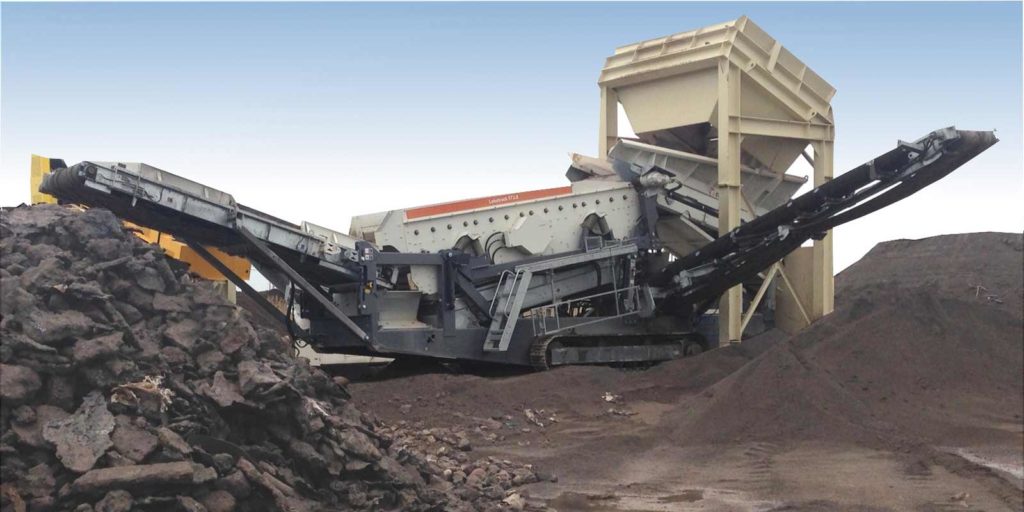Are you considering a track-mounted crusher for your rock crushing application? Here’s what you need to know.
What’s a Track-Mounted Crusher?
First, let’s define our term: A track-mounted crusher (also called a mobile crusher) is mounted on caterpillar treads (tracks).
These machines are different from:
- Trailer-mounted (or portable) crushers, which much be hooked up to a truck to be moved.
- Stationary crushers, which can’t be moved without being disassembled.
With that clarified, let’s dive in.
1. Track-mounted crushers can move.
Let’s get the obvious thing out of the way, first: Track-mounted rock crushers are mobile. Unlike stationary plants, they can be driven to different locations as needed, which means they have a few benefits:
- They can be moved from site-to-site.
- At a single site, instead of having to transport rock to the crusher as excavation progresses, you can move the crusher to the rock, cutting down on time spent moving back-and-forth.
- They can be re-used for different applications, supplementing your ability to get useful production out of a quarry that’s equipped with stationary plants.
2. Track-mounted crushers work at lower volumes.
Stationary plants, often running over 1,000 HP, are great for crushing high volumes of material, but they’re built for longer-term applications and more are difficult to adapt. Track-mounted crushers usually run closer to 300-400 HP, and so they don’t produce as many tons per hour. The trade-off is between volume and flexibility.
3. Track-mounted crushers are powered by diesel.
While stationary plants run on electric power (which requires a hookup and lines), track-mounted units, like other heavy vehicles, run on diesel. This means there are fuel costs to consider, but there is less infrastructure needed to get track-mounted crushers up and running.
4. Track-mounted crushers tend to have more automation built in.
Just as new cars come with computers and automated operations, so do mobile rock crushers.
This is not to say that other rock crushers don’t have automation built in; many stationary plants, especially those produced within the last few years, have electronics and automation installed. Usually, though, there is more of this built into mobile crushers. Take Metso’s Lokotrack© LT200HP™, for example. It comes with a built-in process control system to optimize crushing results, and it even includes remote control software.
5. Track-mounted crushers require training to operate.
It is important to note like any rock crushing equipment, mobile crusher operation requires detailed training.
Training is critical in general (as we’ve written before), but it’s perhaps even more critical for mobile crushers, for two reasons.
First, track-mounted crushers, as mentioned above, are more likely to have higher levels of automation built in. For the machines to be used safely and effectively employees need to be trained on these newer components. Second, track-mounted crushers may be used for different applications over their lifetimes. Operators must have training to use them safely and effectively on a variety of applications.
Just as you have a basic understanding of how to use an excavator but wouldn’t risk your safety by firing it up without any guidance, you should get education before firing up a mobile crusher. You can’t simply purchase or lease a mobile unit and expect your crew to use it without being trained on it.
6. Track-mounted crushers are ideal for certain projects.
As the above noted, let’s end by reviewing the applications where track-mounted crushers tend to be most useful.
They’re ideal for smaller contractors looking for a month or two of use.
If you’re running a smaller project on a shorter timeframe, for instance recycling a pile of concrete or asphalt, you may want to consider using a mobile crusher. Taking this route (as opposed to installing a stationary plant) will cut down on upfront costs and give you more flexibility; you can re-use the crusher later, or even choose simply to lease instead of purchasing.
They’re ideal for larger contractors looking for six months to a year of use.
If you’re a larger contractor looking at a relatively short project, a mobile crusher may come in handy as well. Again, you can lease or purchase, but the key is that going this route reduces your upfront costs and gives you more flexibility onsite.
They’re ideal for quarries looking to supplement or add pieces for increased flexibility.
Finally, quarries can use mobile crushers to supplement production and provide added flexibility. This is helpful, for example, when material needs to be recycled. Let’s say you have too much 1” material, and your stationary plant can’t crush it smaller. Choosing a mobile crusher would allow you to get it down – then relocate the machine to other applications as needed.
Ready to get started with a mobile crusher from Mellott?
We hope this information has been helpful as you consider the aggregate crushing needs at your site.
If you’re considering whether a track-mounted crusher may be right for you, get in touch with us. At Mellott, we’re experts at navigating the different components of crusher selection, setup, and maintenance. We can discuss if a mobile crusher may be the right solution to your needs and we can give you guidance into selecting a machine that will be the best fit possible.
Get in touch with us today online or at 855.554.1606, and make sure you get the right crusher for your needs.

